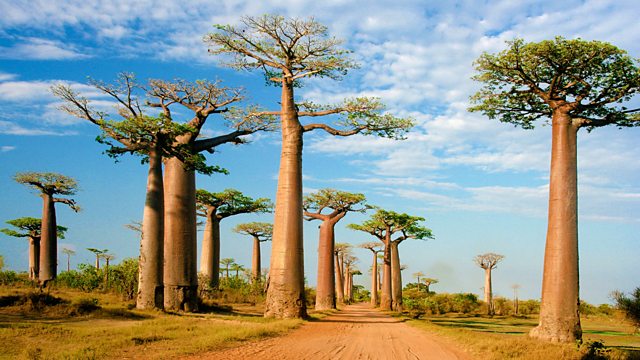Baobab
Brett Westwood explores our ancient relationship with a tree that looks like it is standing with its head in the ground and its roots in the air: the baobab or upside-down tree.
A mature Baobab tree looks like its standing with its head in the ground and its roots in the air - hence the name the Upside-Down tree. But this tree is no joke. It is of enormous spiritual and cultural importance to local people and is also known as The Tree of Life highlighting its importance as a source of water, food, medicine and materials; for example, the bark is used for making rope, the petals for glue and the roots for making ink. But it's the edible fruits, high in vitamin C and anti-oxidants that in recent years have increased the commercial value and importance of the tree as Brett Westwood discovers as he explores our relationship with this iconic tree. Producer Sarah Blunt.
Last on
Heike Pander

For more than 20 years Heike Pander has gained Baobab expertise as an ethnologist and author. She has collected stories, talked with residents and users of the trees and nurtured a lively exchange with scientists, other experts and producers. She has visited Baobab locations in Kenya, Tanzania, Malawi, Zambia, Zimbabwe, Botsuana, Namibia, Mozambique and South Africa.
She works as a freelance ethnologist, journalist and artist with a focus on sustainability, fair trade (tourism, food, fashion), traveling, art, culture, lifestyle and of course her specialty: baobabs. She has twenty years of work experience in international development.
The Tsumkwe Baobab (Pirate Ship):
Heike Pander:
Hetty Ninnis

Hetty Ninnis is team leader in the Rainforest Biome at the Eden Project in Cornwall , where Brett went to see a young Baobab tree.
Hetty has worked at the Eden Project for 11 years, looking after their tropical crops exhibit for five years and six as Rainforest Biome Supervisor. She manages a team of five horticulturalists and thousands of tropical plants. She says “I am passionate about the Rainforest ecosystem, it amazing plants, especially the incredible trees that do so much for us and our planet. I helped to plant one of our Baobab Adansonia digitata trees a few years ago, it had been in a gigantic pot for many years so it is good to see it go I in the ground and watch it flourish. It is still much smaller than the mature Adansonia gregorii trees- Boab - I experienced in the Kimberly north Western Australia great and squat alien giants dotting the extraordinary landscape.”
The Eden project has a project which sources baobabs from Malawi for their Baobab bar, cafes and shops and in so doing supports rural harvesters in Malawi
Dr Sarah Venter

Sarah Venter has been fascinated by baobabs since she was a child and is founder of EcoProducts which is based in Limpopo Province, South Africa. The vision is to make a meaningful contribution to the livelihoods of rural people and to the conservation of baobab trees.
EcoProducts buys baobab fruit from rural communities. The fruit are processed in our factory to extract baobab powder and baobab oil. The extracts are packaged and sold to retail stores and sold in bulk to local and international manufacturers of food and cosmetic products.
Sarah says “Founding and running EcoProducts is one of the most fulfilling things I have ever done. Having a business in which I am involved in the science and conservation of baobabs and at the same time creating employment and supporting communities is hugely fulfilling. “
Kerry Elkins
Broadcasts
- Tue 19 Sep 2017 11:00������̳ Radio 4
- Mon 25 Sep 2017 21:00������̳ Radio 4


